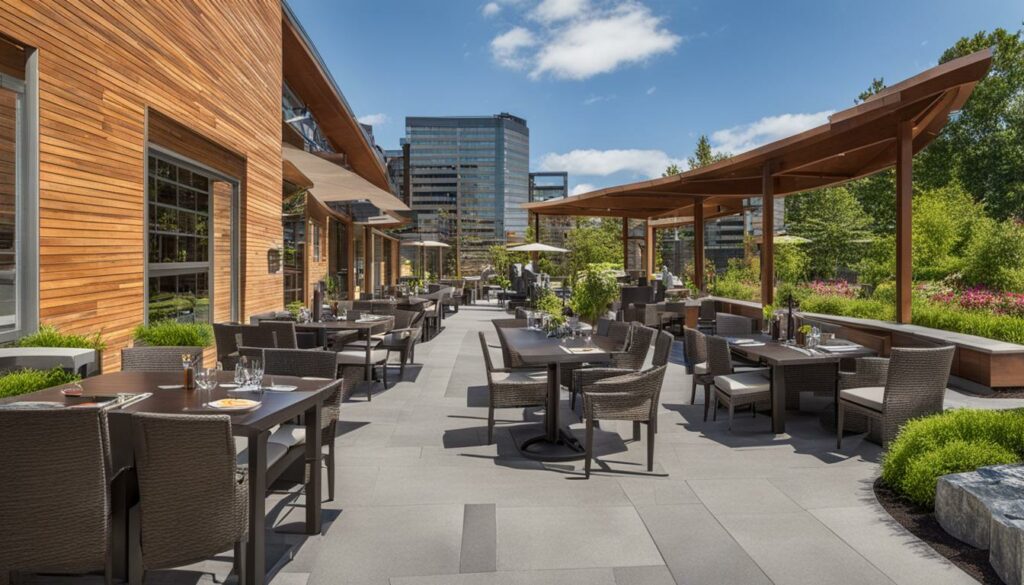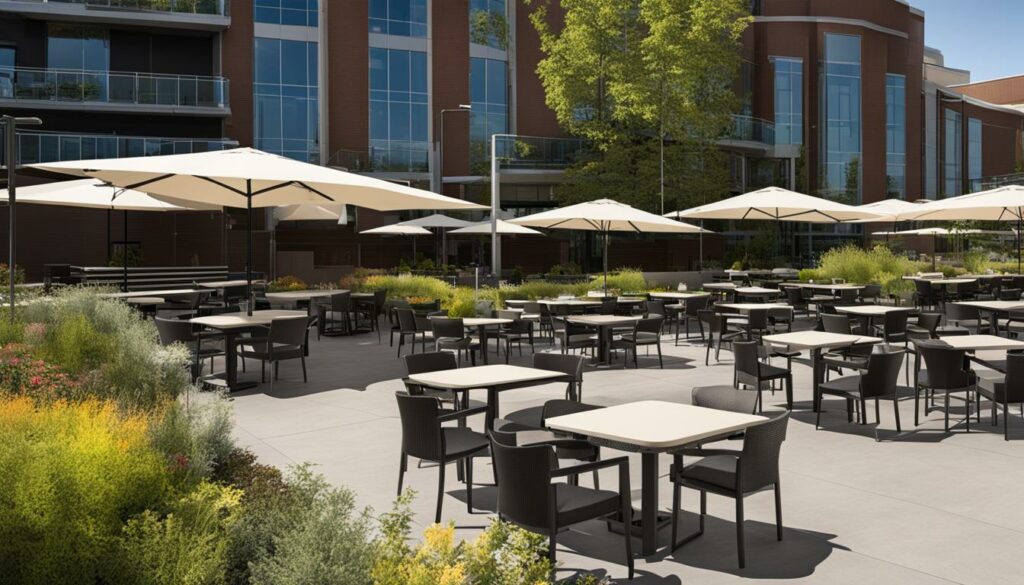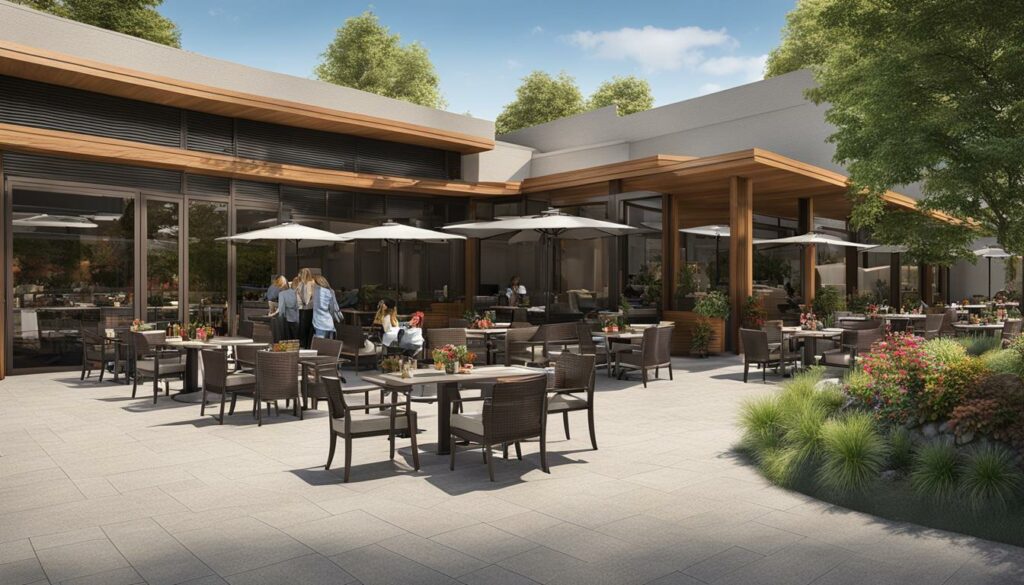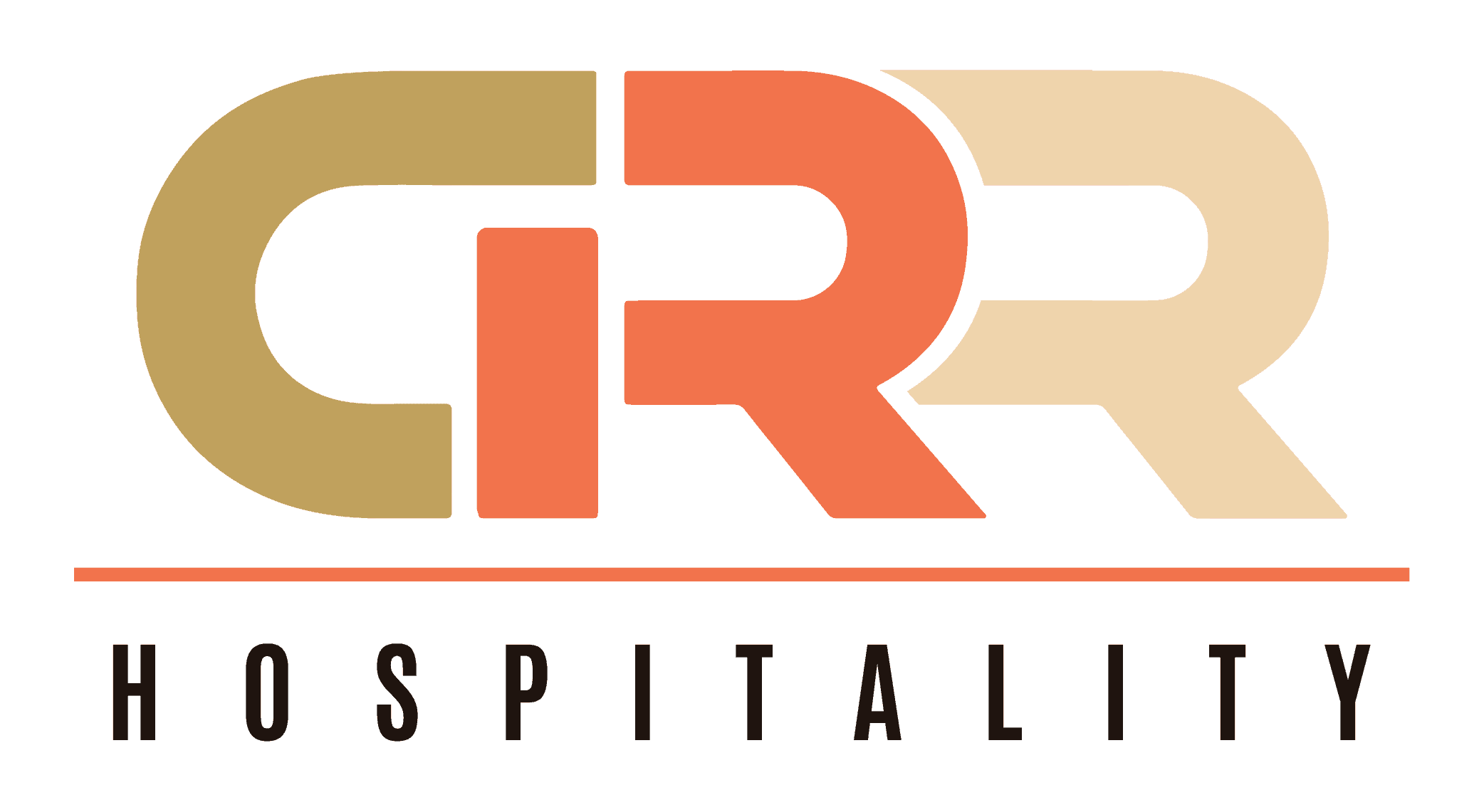Ensuring accessible facilities and inclusive services in outdoor hospitality businesses is crucial to comply with the Americans with Disabilities Act (ADA) guidelines. Outdoor hospitality businesses, including campgrounds, parks, and recreational areas, offer unique challenges in terms of accessibility for guests with disabilities. This article presents best practices for outdoor hospitality businesses to comply with ADA guidelines, which can aid in enhancing the overall guest experience by serving all visitors’ needs.
Key Takeaways
- ADA compliance in outdoor hospitality is important to provide accessible facilities and inclusive services for guests with disabilities.
- Outdoor recreational areas and parks can present unique challenges to businesses regarding accessibility, such as designing accessible outdoor spaces and accommodations.
- Providing assistive devices and services, training staff, and communicating accessibility information to guests are all crucial elements for ADA compliance.
- Engaging with the disability community and showcasing inclusive initiatives can help businesses to continuously improve their accessibility and comply with ADA guidelines.
- Regular accessibility audits and updates are necessary to ensure ongoing compliance with ADA guidelines in outdoor hospitality businesses.
Understanding ADA Compliance in Outdoor Hospitality
Accessible facilities and inclusive services play an integral role in outdoor hospitality. However, ensuring that everyone can enjoy these offerings can be challenging without proper guidance. This section will provide an overview of ADA compliance in the context of outdoor hospitality, including the specific guidelines and regulations that businesses need to adhere to.
Outdoor recreation ADA compliance is governed by the Americans with Disabilities Act (ADA), which prohibits discrimination against individuals with disabilities and requires all businesses to provide equal access to goods, services, and facilities.
The ADA accessibility guidelines for outdoor recreation aim to eliminate barriers for individuals with disabilities and ensure that they have equal opportunities to participate in outdoor activities. These guidelines cover a wide range of elements, including:
| ADA Compliance Outdoor Hospitality Requirements | Description |
|---|---|
| Accessible Routes | Outdoor paths of travel for all guests, including those with disabilities, must be free from obstructions, with adequate width, and a firm, non-slip surface. |
| Accessible Parking | Designated parking spaces for guests with disabilities must be located near accessible entrances. The number of spaces is based on a percentage of the total parking area. |
| Accessible Facilities | All facilities including restrooms, cabins, and showers must be constructed following specific guidelines, including grab bars, clear floor space, and accessible routes. |
| Sensory Elements | Outdoor facilities must provide accommodations for individuals with sensory disabilities, such as audio cues, signage, and captioning. |
It is essential for outdoor hospitality businesses to comply with the ADA accessibility guidelines for outdoor recreation to ensure that guests with disabilities have equal access to the same services and amenities as other guests.
Designing Accessible Outdoor Hospitality Spaces

Creating accessible outdoor spaces is crucial to ensure that everyone can enjoy the natural beauty and outdoor activities on offer. When designing outdoor hospitality spaces, you need to consider various factors to make them accessible to all guests, including those with disabilities. Here are some key considerations:
Ramps and Pathways
Ramps and pathways play a crucial role in making outdoor spaces accessible to all. When designing wheelchair-friendly ramps and pathways, it is essential to ensure that they meet the ADA compliant outdoor facilities standards. The surfaces must be even and slip-resistant, and the slope must not exceed the recommended gradient of 1:12.
Seating Areas
When designing seating areas, it is important to incorporate spaces for wheelchair users and those with other mobility impairments. Providing built-in benches with back support, wheelchair-accessible tables, and areas with plenty of maneuvering space are crucial steps towards making your outdoor space inclusive for everyone.
Signage
Visible and easy-to-understand signage is essential in directing guests with and without disabilities to various amenities and areas in an outdoor hospitality space. It is critical to have clear, readable, and easy-to-understand appointments for each space. Using Braille on signs is yet another way to make the facility accessible to the blind.
Ensuring Accessible Accommodations
One of the key components of ADA compliance for outdoor hospitality businesses is ensuring accessible accommodations for all guests. This includes accessible camping sites, cabins, and restrooms that meet the ADA accessibility guidelines for outdoor recreation.
Accessible camping sites should have level ground, accessible picnic tables, and fire pits with clearance for wheelchairs. Cabins should be designed with accessible entrances, doorways, and paths of travel, and should be equipped with features such as grab bars, lowered countertops, and accessible light switches and outlets.
In addition, restrooms must comply with outdoor hospitality accessibility requirements, including features such as grab bars, lower sink counters, and ample clearance space. Signage that includes braille and high-contrast lettering should also be provided to ensure clear directions for all guests.
| Accessible Accommodations | Features |
|---|---|
| Accessible camping sites | Level ground, accessible picnic tables, fire pits with clearance for wheelchairs |
| Cabins | Accessible entrances, doorways, and paths of travel; grab bars, lowered countertops, accessible light switches and outlets |
| Restrooms | Grab bars, lower sink counters, ample clearance space, braille and high-contrast signage |
Inclusive Design Example:
“Our park revamped our cabin designs to provide accessible cabins. We added ramps, roll-in showers, wide doors, easy grab kitchen cabinets, and lowered countertops, making it easier for wheelchair-bound visitors to stay and enjoy the beauty of nature,”
By ensuring accessible accommodations, outdoor hospitality businesses can create a welcoming environment for all guests, regardless of their physical abilities, and comply with accessible outdoor hospitality standards.
Providing Assistive Devices and Services

Providing assistive devices and services is essential to ensure that outdoor hospitality businesses adhere to outdoor hospitality accessibility standards and ADA compliant outdoor hospitality spaces. Guests with disabilities need to feel accommodated and supported when they participate in outdoor recreational activities.
One important way to make outdoor experiences accessible is through accessible parking. To ensure that all guests, regardless of their mobility, have access to suitable parking spaces, outdoor hospitality businesses should provide designated accessible parking spots that comply with ADA standards.
Other assistive devices, such as wheelchairs and mobility scooters, should be available for rent to guests with physical disabilities. In addition, sign language interpreters should be on hand to assist guests who are deaf or hard of hearing.
Assistive devices and services can enhance the overall experience for guests with disabilities, allowing them to enjoy outdoor recreational activities alongside their peers. By making these devices and services available, outdoor hospitality businesses demonstrate their commitment to inclusivity and make a positive impact on the disability community.
Training Staff for Inclusive Service
Providing inclusive and accommodating service is essential to create a welcoming environment for all guests, including those with disabilities. To ensure ADA compliant outdoor hospitality spaces and maintain outdoor hospitality accessibility standards, businesses must prioritize training staff members on effective communication techniques and sensitivity training.
Staff should be trained to recognize and respond to the diverse needs of guests with disabilities. This includes learning to communicate effectively with guests who have hearing, vision or speech impairments. Training should also cover offering assistance to guests who require mobility aids, such as wheelchairs or scooters.
Outdoor hospitality businesses should provide regular training seminars and refresher courses to ensure that staff is equipped to assist all guests. Effective training should empower staff to address the individual needs of each guest, thus creating a memorable and gratifying experience for everyone.
Effective Communication Techniques for Staff
Effective communication is essential in creating an inclusive and welcoming environment. Therefore, staff members should be trained on different methods of communication to effectively convey important information to guests with disabilities. These methods may include:
- Sign language interpretation
- Written communication or visual aids
- Email or text messaging
- Relaying information through a guest’s companion or caregiver
Providing multiple communication options will enable guests with disabilities to engage with staff members easily. Putting forth effort to create an accessible and inclusive atmosphere for all guests not only fulfills ADA compliance requirements but enhances the overall experience for all visitors.
Sensitivity Training for Staff
Sensitivity training is vital for staff members to appreciate and understand the challenges facing guests with disabilities. It covers various topics such as disability etiquette, overcoming attitudinal barriers and handling common situations that may arise. Through this training, staff members gain empathy and a better understanding of disability, its effects, and how to provide guests with a dignified experience.
For example, sensitivity training will impart knowledge on how to offer support for those who have difficulty getting in and out of vehicles, or navigating stairs. Staff members should recognize and offer their assistance to such guests, accompanying them to their designated locations. This can be achieved by providing wheelchair ramps and curb cuts, installing handrails, and offering assistance as required.
“Offering inclusive services to all guests requires more than just creating ADA compliant outdoor hospitality spaces and adhering to outdoor hospitality accessibility standards. Staff members that are trained to provide exceptional and inclusive services contribute to the overall guest experience by creating a comfortable and memorable stay for all.”
Communicating Accessibility Information

Clear communication is essential to ensure that guests with disabilities are aware of the accessible features and services available to them in outdoor hospitality businesses. By providing comprehensive information on websites, brochures, and onsite signage, businesses can demonstrate their commitment to inclusive practices and help guests with disabilities plan their visits more easily.
For instance, businesses can list all the ADA compliant outdoor facilities available, such as accessible parking, restrooms, campsites, and trails, either on the website or as part of their brochures. This way, guests can check that their specific needs will be met before arriving at the venue.
Businesses can also provide details of the inclusive outdoor hospitality design used, so guests can understand which areas of the premises are accessible and how. This can be communicated through a combination of text, images, and videos, allowing guests to gain a better understanding of the venue’s layout and atmosphere. Signage is equally important to indicate accessible routes and facilities, with clear, readable text and icons that conform to ADA standards.
Examples of Effective Communication Strategies
| Communication Strategy | Description |
|---|---|
| Website Information | Provide a dedicated accessibility page on your website, with detailed information on accessible facilities and services available. |
| Brochure Details | Include ADA compliant outdoor facilities, inclusive outdoor hospitality design, and other accessibility information in promotional material, ensuring clarity and accessibility. |
| Onsite Signage | Use clear and concise signage throughout the venue, highlighting accessible routes, entrances, restrooms, parking areas, and other facilities. |
| Communication Aids | Provide communication aids such as sign language interpretation or devices for guests with hearing or speech impairments. |
By adopting these best practices of inclusive communication, businesses can make a positive impact on guests with disabilities and lead the way towards a more accessible outdoor hospitality industry.
Regular Accessibility Audits and Updates
Ensuring accessibility in outdoor hospitality businesses is an ongoing process that requires regular audits and updates. By conducting accessibility audits, businesses can identify any areas that need improvement and make necessary updates to ensure compliance with outdoor hospitality accessibility requirements and standards.
Updating facilities and services to meet accessibility standards is not only crucial for legal compliance, but also for improving the overall customer experience for guests with disabilities. Regular accessibility audits and updates demonstrate a commitment to inclusivity.
It’s recommended that businesses conduct accessibility audits at least once a year to ensure they are complying with the latest ADA guidelines and outdoor hospitality accessibility standards. Audits should involve a comprehensive review of the facilities and services provided, as well as interactions with guests to gain feedback and identify any issues.
Businesses should also establish a system for tracking and addressing accessibility concerns, such as a dedicated hotline or email address for submitting feedback. This way, guests can easily communicate any issues they encounter, which can be addressed in a timely manner to improve the overall accessibility of the outdoor hospitality business.
Engaging with the Disability Community

Businesses in the outdoor hospitality industry must actively engage with the disability community to gather valuable feedback and recommendations for improving accessibility. This engagement can take many forms, including hosting focus groups, surveying guests, and collaborating with disability advocacy organizations.
By building relationships and creating open lines of communication, businesses can work to address concerns and make meaningful changes in accordance with ADA accessibility guidelines for outdoor recreation. Ongoing engagement with the disability community can also help demonstrate a commitment to inclusive and accessible outdoor recreation.
Key Strategies for Engaging with the Disability Community
Here are some key strategies that outdoor hospitality businesses can use to engage with the disability community:
| Strategy | Description |
|---|---|
| Host focus groups | Invite members of the disability community to provide feedback on accessibility and inclusivity in your outdoor hospitality spaces. |
| Conduct surveys | Survey guests with disabilities to gather data on their experiences and identify areas for improvement. |
| Partner with disability advocacy organizations | Collaborate with local and national organizations to gain valuable insights and recommendations. |
| Offer disability-specific programming | Develop programming and events that cater specifically to the needs and interests of guests with disabilities. |
| Showcase inclusive initiatives | Highlight your business’s efforts toward accessibility and inclusion, including any updates or improvements made in response to feedback from the disability community. |
By implementing these strategies and actively seeking feedback from the disability community, businesses can demonstrate their commitment to accessible outdoor recreation and ensure that all guests can enjoy their facilities and services.
Showcasing Inclusive Initiatives and Success Stories
In recent years, many outdoor hospitality businesses have recognized the importance of prioritizing accessibility and have implemented initiatives to ensure their facilities are welcoming and inclusive for all guests. These businesses have gone above and beyond to create accessible outdoor leisure spaces, ensuring that everyone can enjoy nature and outdoor activities.
One such business is Nature’s Retreat, located in the heart of the Adirondack Mountains. This majestic resort offers a range of accessible accommodations, including wheelchair-friendly cabins, and has made significant upgrades to their outdoor facilities to ensure that they are ADA compliant. In addition, they provide assistive devices and services, such as golf carts to transport guests with mobility impairments to different areas of the resort.
The Pines, a popular camping and RV park in Oregon, is another business that has prioritized accessibility. They have designed their outdoor facilities to be fully accessible, providing paved pathways, accessible restrooms, and designated parking spots for guests with disabilities. The park also offers ADA compliant cabins and RVs for those who require accessible accommodations.
A third example is Wilderness Adventures, a travel company that specializes in outdoor adventure trips for people of all abilities. They have developed inclusive guides and itineraries for their trips, as well as customized equipment and gear to accommodate guests with a wide variety of disabilities.
These businesses serve as shining examples of the ways in which outdoor hospitality can be made accessible and inclusive for all. They demonstrate that with the right measures and approaches, it is possible to create outdoor leisure spaces that are welcoming, safe, and enjoyable for everyone.
Conclusion
Ensuring ADA compliance in outdoor hospitality businesses is not only a legal requirement but also a moral obligation to provide equal opportunities and access to all guests. The best practices discussed in this article, from designing accessible spaces to providing assistive devices and training staff for inclusive service, are crucial to creating an inclusive environment in outdoor leisure spaces.
Regular accessibility audits and updates, as well as engaging with the disability community, can facilitate ongoing improvements to accessibility in outdoor hospitality. By showcasing successful initiatives and success stories, businesses can inspire others to prioritize accessibility and contribute to a more inclusive society.
Overall, prioritizing ADA compliance in outdoor leisure spaces is a necessary step towards creating a more equal and accommodating society for all individuals.
FAQ
What is ADA compliance in outdoor hospitality?
ADA compliance in outdoor hospitality refers to adhering to the Americans with Disabilities Act (ADA) guidelines and regulations to ensure that outdoor facilities, services, and accommodations are accessible to individuals with disabilities.
How can outdoor hospitality businesses ensure ADA compliance?
Outdoor hospitality businesses can ensure ADA compliance by implementing various best practices, such as designing accessible facilities, providing inclusive services, training staff members, communicating accessibility information, and conducting regular accessibility audits and updates.
What are some examples of accessible outdoor facilities in outdoor hospitality spaces?
Examples of accessible outdoor facilities in outdoor hospitality spaces include accessible parking spaces, ramps, pathways with appropriate slopes, wheelchair-accessible seating areas, accessible restrooms, and signage with braille and tactile elements.
What are the ADA accessibility guidelines for outdoor recreation?
The ADA accessibility guidelines for outdoor recreation include specifications for accessible routes, ramps, curb ramps, parking, picnic facilities, camping sites, fishing piers and platforms, viewing areas, and recreational boating facilities.
How can outdoor hospitality businesses provide assistive devices and services?
Outdoor hospitality businesses can provide assistive devices and services by offering amenities such as wheelchair rentals, beach wheelchairs, mobility devices, visual alarms, accessible transportation, and arranging for sign language interpreters or captioning services.
Why is staff training important for inclusive service?
Staff training is important for inclusive service as it equips employees with knowledge and understanding of disability etiquette, effective communication techniques, and the ability to provide appropriate assistance and support to guests with disabilities.
How can outdoor hospitality businesses communicate accessibility information effectively?
Outdoor hospitality businesses can communicate accessibility information effectively by including detailed information on their websites, brochures, and other promotional materials, as well as providing clear signage throughout their facilities to guide guests with disabilities.
What should outdoor hospitality businesses consider when conducting accessibility audits?
When conducting accessibility audits, outdoor hospitality businesses should consider evaluating their facilities, services, and accommodations for compliance with ADA guidelines, addressing any areas of non-compliance, and implementing necessary updates or modifications to improve accessibility.
How can outdoor hospitality businesses engage with the disability community?
Outdoor hospitality businesses can engage with the disability community by actively seeking feedback, involving individuals with disabilities in the decision-making process, participating in disability-focused events or organizations, and collaborating with disability advocates and organizations to improve accessibility.
Can you provide examples of outdoor hospitality businesses that prioritize accessibility?
Yes, there are many outdoor hospitality businesses that prioritize accessibility. Examples include campgrounds with accessible camping sites and amenities, national parks with accessible trails and visitor centers, and outdoor adventure companies that offer inclusive activities for individuals with disabilities.





